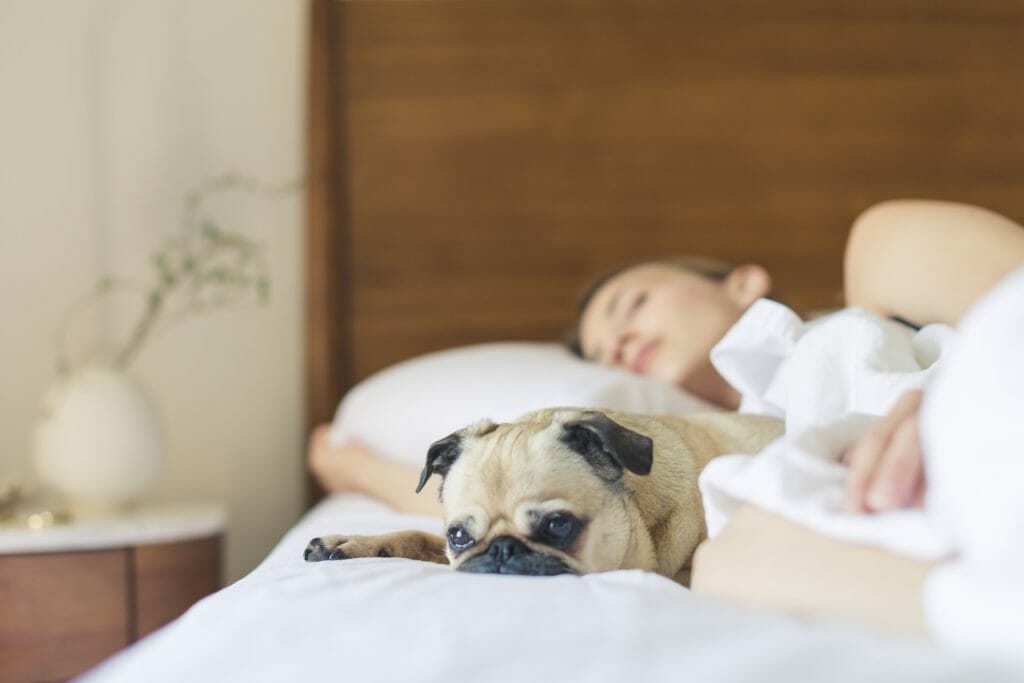Your Sleep Hygiene Guide

Sleep hygiene is the practice of implementing rituals to help you sleep. To make it simple, we’ve created a handy downloadable guide for you to have at your fingertips.
Sleep hygiene issues can be a major drawback for women going through perimenopause, menopause, and post-menopause. And if that’s not bad enough we also noticed a marked increase in the struggle with the advent of COVID-19.
It’s an important issue to address because good-quality sleep is crucial for both overall health and healing of the body. Not to mention an easier menopause transition.
You might assume that because your eyes are closed and you’re resting in bed your body is in slow mode. However, it’s busy processing the byproducts of stress, toxins, emotions, repairing damaged tissue, boosting hormone supply and strengthening immunity.
And you thought you worked hard during the day?! Your body is a warrior beavering away all night long. 😊
Unfortunately, a lot of our lifestyles these days impede the body’s hard working night shift. Many of us run on stress overload, caffeine, alcohol and other sleep inhibitors. As such, our natural sleep processes aren’t supported and we have difficulty getting a good night of ZZZ’s. This can be problematic for women in peri/menopause because estrogen declines and the stress hormone cortisol comes more into play.
Then we get hit with a global pandemic.
Put the three things together: lifestyle, hormones and a pandemic (or the first two during normal times) and voila! The perfect storm for sleep problems covering all the bases: falling asleep, staying asleep or full-blown insomnia.
Centers for Disease Control Study
In 2017, the US Centers for Disease Control (CDC) published scientific reports on the sleep quality of menopausal women.
- They found sleep problems increase during perimenopause (late 30s to 40s). More than half (56 percent) of women studied slept less than seven hours per night.
- The findings also showed that nearly a quarter of women in perimenopause reported having trouble falling asleep. Thirty percent had trouble staying asleep.
- Nearly 50 percent of women in perimenopause awoke still feeling tired.
- Once women transitioned to post-menopause this tended to improve but everyone is different and this wasn’t the case for all.
- In fact, the CDC found that 40 percent of women in post-menopause slept less than seven hours per night. Twenty-seven percent struggled to fall asleep, and 35 percent found it difficult to stay asleep and insomnia became more common.
That’s a lot, isn’t it? The good news is there are some rituals and habits you can put in place to help.
Your Sleep-More-Soundly Guide
These practices should be a priority to help you through menopause. A good night’s sleep supports overall health and immunity, helps manage weight, and encourages healthy food and lifestyle choices.
How Sleep Works
We have a tiny pea-sized glandule in the middle of our brain called the pineal gland. It works according to the circadian rhythm – our natural 24-hour sleep/wake cycle – and is inactive during the day. As darkness falls it begins to secrete the hormone melatonin.
Melatonin is important to our wellbeing as it helps calm the brain and counter the stress hormone cortisol. It usually begins producing around 9pm and makes us feel more relaxed as it prepares us for sleep. For ideal sleep, melatonin levels should rise and cortisol levels should lower until daylight. This is when the pineal gland becomes inactive again and waking cortisol is produced.
Sleep may be disturbed if you’re exposed to bright light at night and the release of melatonin is inhibited. Noisy environments which cause cortisol to elevate and heavy meals requiring active digestive processes can also cause disruption.
The good news is that by making small changes you can improve your sleeping story:
7 Simple Sleep Hygiene Tips
- Have your last meal at least three hours before bed and don’t snack. This surprises many people as they don’t realise the digestive process can impact sleep. If you have insomnia this could be your secret weapon.
- Say no to caffeine after 2pm. Coffee, tea (even green tea), cola and chocolate are all on the hit-list. Caffeine can stay in the system for many hours after we’ve imbibed it.
- Leave your worries behind. If you can, leave brain work for daylight hours. Ban next-day-planning, balancing the budget and talking about difficult things in the evenings.
- Relax. Choose to embrace calm and read a book, take a bath, pat your pet, fold the laundry.
- Ditch the bright lights. Use soft lighting and get off your screens. No texting, emails, apps, TV, Netflix 1-2 hours before bed.
- Create calm. Infuse an aromatherapy diffuser with high quality relaxing oils like lavender, neroli, and basil. Clary Sage is an excellent choice for women going through menopause.
- Herbal teas like chamomile, lavender, lemon balm, and valerian root help set the stage for sleep. So does an Epsom salts bath. The warm water and natural magnesium in the Epsom salts are both calming and relaxing. You can boost these qualities by adding a few drops of your relaxing essential oils.
Sweet Dreams 💤









